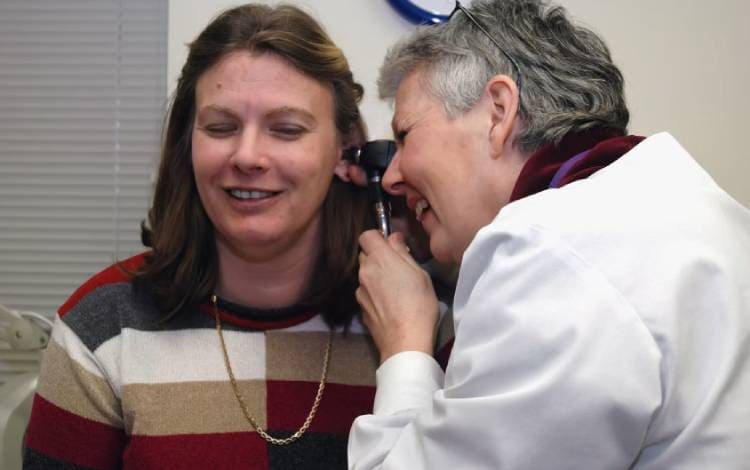
@ShahidNShah


Have you ever found your favorite meal suddenly tasteless? If so, you’re not alone. Millions of people experience changes in their sense of taste, often due to illness, injury, or medication. But what if there was a way to get those flavors back? That’s where otolaryngologists (also known as ear, nose, and throat doctors or ENTs) come in.
These specialized physicians understand the complex relationship between taste and smell, and they have a range of tools and techniques to help restore it.
If you’ve been struggling with flavor loss, let’s explore how these specialists work their magic to restore the joy of tasting delicious food.
Stay connected.
Otolaryngologists are doctors who specialize in diagnosing and treating conditions related to the ear, nose, and throat. When illness affects your ability to taste, it’s often linked to problems with the nose and throat.
These professionals use their expertise to identify and treat these underlying issues, offering patients a chance to regain their sense of flavor.
Several illnesses can disrupt your ability to enjoy food. Respiratory infections, like the flu or COVID-19, often lead to a temporary loss of recognizing the flavor. Sinus infections, colds, and even allergies can also cause changes in perception. These conditions typically lead to inflammation and congestion in the nasal passages, which impacts your sense of smell and, consequently, your ability to flavor.
Certain medications and treatments, such as antibiotics or chemotherapy, can also alter taste. Chronic conditions like diabetes and neurological disorders may lead to prolonged or permanent changes. Understanding the root cause is crucial in developing an effective treatment plan.
If you’re struggling with the issue, seeking help from top otolaryngologists can make a significant difference. These specialists have the training and experience to diagnose and treat a wide range of conditions affecting taste.
The best part is that many of the treatments they offer can lead to a full recovery of your sense of your gustatory function. This allows you to enjoy food again and improve your quality of life.
When you visit an otolaryngologist for taste loss, they will begin with a comprehensive evaluation. This assessment usually includes a detailed medical history and a physical examination of the nose and throat. They might also ask you to describe your symptoms and any recent illnesses or medications.
Advanced diagnostic tools, such as endoscopy or imaging tests, might be used to examine your nasal and throat structures more closely. These tests help professionals pinpoint any blockages, inflammation, or other abnormalities that could be affecting the ability to recognize the aroma.
After figuring out the cause of the issue, the ENT specialist can offer a variety of treatments. If you have an infection, they might give you medications to clear it up. For sinus issues, nasal sprays, decongestant treatments, or even surgery could include removing the blockage.
If a medication is the reason for the issue, they might suggest changing the dose or switching to a different drug. They also provide advice on managing chronic conditions that affect flavor perception, helping you find ways to enjoy food again.
Restoring your sense of taste often involves more than just medication. Otolaryngologists might suggest exercises to help retrain your taste buds. These exercises expose you to different flavors in a controlled way, helping your buds learn to recognize them again.
They may also recommend nutritional counseling. Since losing your sense of taste can change how you eat, it’s important to maintain a balanced diet. Working with a dietitian can help you find foods that are still enjoyable and nutritious, even if your sense of flavor isn’t fully back.
Otolaryngologists may recommend lifestyle changes to enhance the perception. This could include quitting smoking or adjusting dietary habits to include more zinc-rich foods, which are essential for flavor bud function.
Simple modifications like maintaining good oral hygiene or using humidifiers to keep nasal passages clear can also play a crucial role in improving taste sensations. These proactive steps help patients not only manage symptoms but also contribute to overall sensory health.
Losing the ability to sense flavor can be more than a nuisance. It can affect your enjoyment of food and your overall health. Luckily, otolaryngologists have the knowledge and tools to help restore this vital sense. Taking this step means not just addressing a symptom but reclaiming a part of life’s joy. So, why wait? Reach out to a qualified otolaryngologist today and rediscover the pleasure of savoring food.

Chief Editor - Medigy & HealthcareGuys.
Have you ever wished you could see what the future holds? What if I told you that while I can’t give you the all-knowing crystal orb of the legendary witches, you could, with a little effort, learn to …
Posted Jun 13, 2024 Healthcare Predictive Analytics
Connecting innovation decision makers to authoritative information, institutions, people and insights.
Medigy accurately delivers healthcare and technology information, news and insight from around the world.
Medigy surfaces the world's best crowdsourced health tech offerings with social interactions and peer reviews.
© 2025 Netspective Foundation, Inc. All Rights Reserved.
Built on Apr 17, 2025 at 6:07am